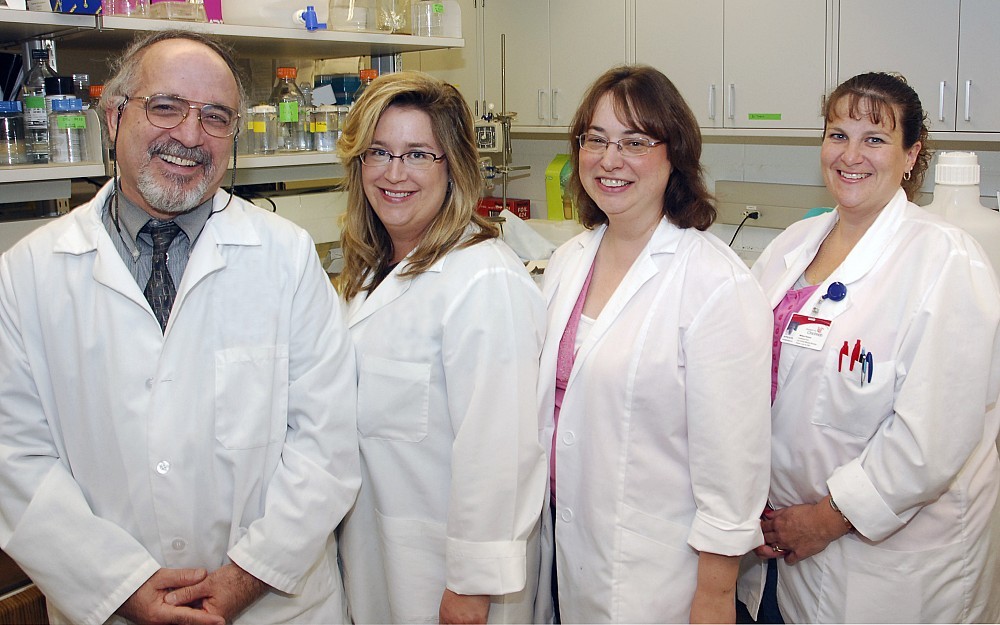
UC Researchers Mentor Local Science Teachers
Two Tristate middle school science teachers participating in real-life research projects at the University of Cincinnati (UC) Academic Health Center are not only expanding their knowledge in their field, they are also applying what they learn to improve the health of their students.
Melissa Parsons, of Norwood Middle School, and Tina Hale, of Ockerman Middle School, in Florence, Ky., are studying the effects of different popular diets on weight, kidney function, blood pressure and health.
Their experience is part of a Frontiers in Physiology fellowship program sponsored by the American Physiological Society (APS) to give science teachers the opportunity to do serious laboratory research.
We want to make sure our two teachers learn hands-on scientific techniques and follow a research process from start to the finish, says Manoocher Soleimani, MD, professor, researcher and director UCs nephrology division. As a result, we hope they will gain a greater understanding of science, which they can pass on to their students.
Soleimani is one of 18 APS members working with recipients of the 2006 Frontiers in Physiology fellowships. Assisting him in mentoring the two teachers are research assistant professor Hassane Amlal, PhD, and research assistant Sharon Barone.
Soleimani and Amlal designed the research projects to answer some of the questions about which diet is best for kidney function, body weight and general health. Barone provides the day-to-day lab instruction.
If you do research, you understand it better, says Parsons of her experience. Participating in a scientific research project in the UC lab you understand the results and feel the excitement much more than if you just read about it.
Now that Parsons school cafeteria has decided to serve healthier lunches, many students are unhappy that French fries are no longer on the menu. Im excited to be able to share results of this study, in hopes it will help my students to understand the consequences of a high-fat or high-salt diet, she says.
Says Hale, This was the first time I participated in a scientific research project. It has been a real learning experience for me.
TheAPS awarded the research fellowships to 20 middle school and high school teachers in 12 states and the District of Columbia. The society funds each teacher to work in an APS members research laboratory for up to eight weeks.
The researchers continue to work with the teachers through the school year, visiting their classrooms or having the teachers and their students visit their labs.
We look forward to the mentoring relationship continuing into the school year and possibly having a lasting impact for years to follow, says Soleimani.
The award provided each teacher with a stipend and travel expenses of up to $8,500 and included a week-long science-teaching forum in which they explored innovative research and classroom teaching techniques.
The fellows also received travel expenses to attend the APS annual meeting, Experimental Biology 2007, in the spring, an event that attracts over 10,000 scientists annually.
Founded in 1887 to foster basic and applied bioscience, the APS now has over 10,000 members and publishes 14 peer-reviewed journals.
Since 1990, its Frontiers in Physiology program has helped 345 teachers nationwide increase their understanding of scientific research methods and the importance of biomedical research.
For more information about APS educational programs, e-mail: education@the-aps.org or visit the APS website at www.the-aps.org/education.htm.

Norwood science teacher Melissa Parsons with UC nephrology researcher Hassane Amlal, PhD, and research assistant Sharon Barone.
Tags
Related Stories
WVXU: A look at alcohol, de-alcoholized wine and everything in...
May 7, 2024
The University of Cincinnati's Michael Schoech joined Cincinnati Edition for a panel discussion about current rates of alcohol consumption and the growing number of non-alcoholic alternatives.
Washington Post: The hour after leaving day care is a...
May 6, 2024
The Washington Post highlighted research led by University of Cincinnati and Cincinnati Children's Hospital researchers that found kids eat fewer healthy foods and take in 22 percent of their day’s added sugar intake in the single hour after they’re picked up from child care.
Local 12: Diabetes study focuses on how long blood sugar control...
May 3, 2024
The University of Cincinnati's Robert Cohen spoke with Local 12 about the GRADE study that shows how a new medication needs to be developed to help treat people with type two diabetes.
